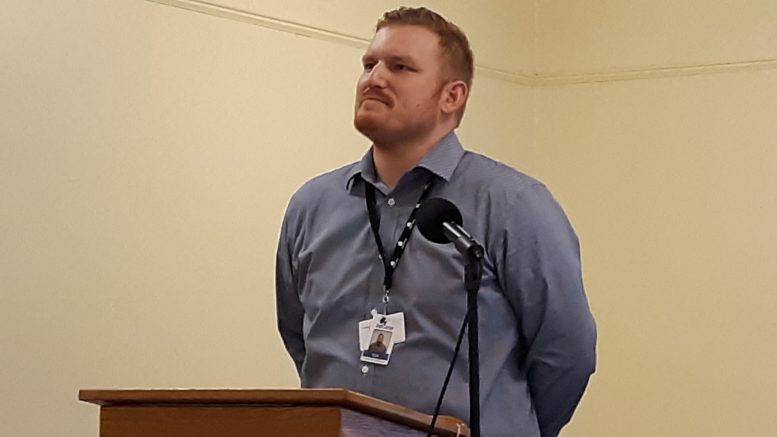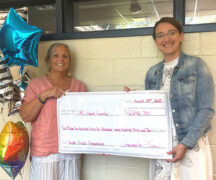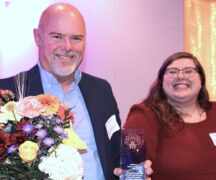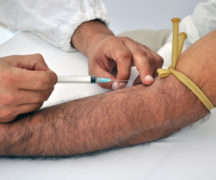By JAN LARSON McLAUGHLIN
BG Independent News
After Carol Beckley’s life turned dark, she tried to end her life five or six times.
After Kyle Snyder started stealing from his dad’s medicine cabinet, he ended up overdosing on opiates multiple times.
Their lives have few similarities – except Beckley and Snyder were both saved by the safety net stretched out by the Wood County Alcohol, Drug Addiction and Mental Health Services Board.
So on Monday, the two told their stories at the kickoff for the WCADAMHS levy which will appear on the November ballot.
“Nothing speaks as clearly as to hear somebody’s personal story of their recovery,” said Tom Clemons, executive director of WCADAMHS.
Beckley, who grew up in Wood County, started having problems 26 years ago.
“My life as I knew it fell apart,” she said.
She grew detached from things that were important to her, and started cutting herself. Beckley said she attempted suicide five or six times.
Over the next five years, she was hospitalized about 20 times.
“It was a revolving door for me,” she said.
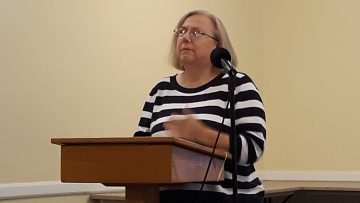
Carol Beckley talks about mental health services available in Wood County.
At that point, Beckley moved back to Wood County, where she found the safety net of services for people with mental health and addiction problems. Through Behavioral Connections, she was assigned a psychiatrist, therapist and case manager. She started hanging out at the Connections Center, where people cared how she was doing.
“It was a place I could go on a daily basis,” Beckley said. “It got me out of my house. I started to crawl back to some sense of normalcy.”
Without the levy funding for local mental health services, Beckley would not have been standing at a podium Monday telling her story.
“Without the funding, without the help, I wouldn’t be here today,” she said. “Life as I know it is not the life I planned – but it is very rich.”
Snyder was helped by a different safety net – one for addicts.
As a child, Snyder watched as his father struggled as he waited for a kidney transplant. He remembered the burden and pain he felt as a child.
“I remember at 10 years old I didn’t want to be alive,” he said.
As a teenager, Snyder searched for ways to escape his world. “Anything to alter my reality,” he said.
When alcohol was no longer enough, Snyder began taking his dad’s prescribed morphine from the medicine cabinet. When he was 27, his dad died. Soon after, Snyder had his first overdose. His family was warned that he might not survive.
But he lived – only to repeat the process again.
“I got high about a week later,” he said. Snyder remembers not really wanting to continue taking drugs. “But I couldn’t see a better alternative.”
Snyder lost everything important to him, and went to rehab. He took the right steps – he went to treatment, attended meetings, got a sponsor. But he wasn’t ready to stop.
“I still wanted to be able to party and have fun,” he said.
Snyder’s “aha moment” came soon after, when he overdosed again as he was getting ready to take off in his car. He woke up in an ambulance, relieved to find out he had passed out before he started driving.
That was almost four years ago. Now Snyder is working at the addiction recovery houses in Cygnet and Northwood.
“It’s the best job I’ve ever had,” he said. “Every guy who goes in there, I know what he’s going through. There’s a better life out there.”
Those addiction recovery houses, and the mental health services are all part of the safety net supported by the WCADAMHS levy.
The levy makes up one-third of the county’s funding for mental health and addiction services, according to Doug Cubberley, president of the WCADAMHS Board.
The 1-mill replacement levy will bring in approximately $3.2 million a year. It will cost about $35 a year for the owner of property assessed at $100,000.
Passage of the levy is vital since this is the final year of the current levy, Cubberley said.
“If this levy fails to get the majority vote, our programs will have to be severely curtailed,” he said.
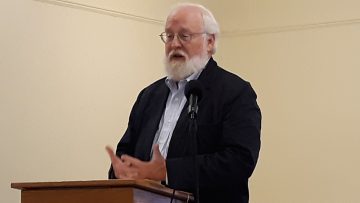
Tom Clemons talks about need for 1-mill replacement levy.
Clemons stressed that the board has reduced expenses and secured a number of grants.
“We believe we are good stewards of public funds,” Clemons said.
The board has focused on prevention programs, more rapid responses, mobile crisis services, expanded recovery programs, and better training for therapists. All those efforts are making a difference, he said.
“We’re seeing more and more people recover,” Clemons said.

